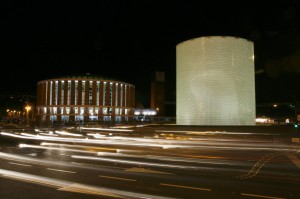
Another anniversary of the Madrid terrorist attacks of March 11, 2004, comes and goes and with it, another storm of acrimony that highlights, in the ugliest way possible, Spain’s divisions.
It’s now eight years since bombs planted by Islamic radicals were detonated on trains in or near Madrid during the morning rush hour, killing 191 people and injuring nearly 2,000 more. Enough time, you would think, for society to digest and come to terms with the attack, if not the grief it caused.
But as dozens of relatives of those killed gathered at Atocha train station on Sunday, to listen to a saxophonist play a moving recital to their loved ones and others pay verbal tributes, the mood was momentarily broken. Shouts could be heard from behind us; shouts of abuse, it turned out. Logic told me that only half-witted louts would yell such things at a crowd of people who had suffered such pain and were meeting to remember the dead. But these particular individuals were part of the disturbingly large number of Spaniards who still insist that ETA, not jihadists, were ultimately responsible for the March 11 attack.
The police, civil guard and judiciary spent enormous amounts of time, energy and resources investigating the case and the conclusion was always the same: no ETA involvement. And yet, nearly a decade on, many cling to the ETA conspiracy theory – or worse, the theory that the Socialist Party was in cahoots with ETA killers ahead of the bombing – with the deranged conviction of Charlie Sheen spouting his 9/11 spiel.
While Sheen is not the only American who believes that theory, he is in a tiny minority and for the most part, 9/11 conspiracy theorists have not managed to muscle their way into US mainstream media, or divide the country’s people.
But in Spain, March 11 has become a byword for irrational tensions, division and even hatred. It’s comforting to think that only a certain type of Spaniard believes in the ETA theory: elderly, poorly educated folks who believe anything their right-wing newspapers and radio tell them. But middle-aged taxi drivers and well-educated twenty-somethings are also among those who have told me that “we’ll never know who really carried out 11-M.”
The responsibility for this lies in great part with El Mundo newspaper, which has made the rumours and lies about ETA’s involvement almost its blue riband issue, in the name of investigative journalism.
The ongoing tragedy of March 11 is that after such a moving initial response to a terrorist atrocity, when Spaniards of all walks of life seemed to unite in grief, the date has since become the focal point of hateful political schisms. And the conspiracy theory itself seems to be little more than an excuse; what really seems to gnaw away at the March 11 lunatics is the fact that the Socialist Party unexpectedly won the 2004 general election three days after the attack. They will never forgive Zapatero for his victory, it seems, even though it was conservative José María Aznar’s mishandling (or manipulation, some would say) of the bombing aftermath that helped unseat his party from power.
On Sunday, Pilar Manjón, the president of the March 11 victims’ association, whose son died in the bombing, spoke out against the “lies, insults, fallacies and threats” that surrounded this year’s anniversary. She was referring to the attorney general’s apparent reopening of the case to pursue a line of investigation spurred by the conspiracy theorists – although he has since played this down. Another victims’ group had rejoiced at the attorney general’s announcement, declaring the case “still open, now more than ever.”
Manjón said that after this year’s Atocha anniversary event, her email inbox was flooded with abusive emails. But presumably there will eventually come a time when March 11, 2004 is so far in the past that a woman who lost her son that day will not be yelled at in the street for speaking her mind about who killed him.
Leave a Reply
You must be logged in to post a comment.